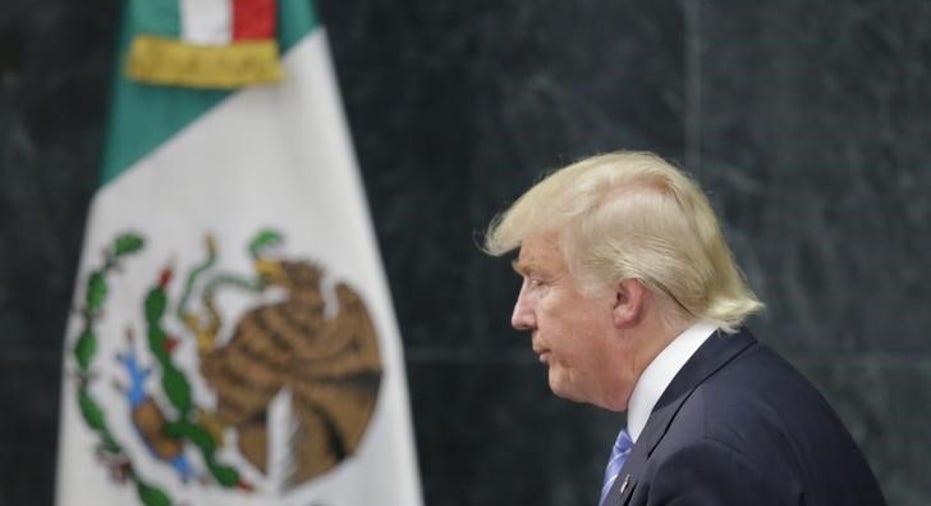Mexican banks cut credit card exposure on Trump, rate risks

MEXICO CITY – Some Mexican banks are lowering credit card spending limits and raising consumer lending standards in the face of an economic slowdown, rising interest rates and the U.S. election victory of Donald Trump.
After a period of robust overall credit growth, Mexican banks are cutting credit card exposure to counter a potential rise in consumer defaults and the risks of an economic shock should Trump restrict U.S. trade and business with Mexico.
The moves come on concerns Latin America's second largest economy could see more turbulence in 2017 after its peso currency lost 19 percent this year, largely on fears of a Trump administration.
Lenders would see profits hit if Trump scraps the North American Free Trade Agreement or discourages U.S. companies from moving to Mexico, as he vowed to do on the campaign trail, some banks and analysts said.
"That measurement of how much he is going to be able to do is what we have to analyze every day," said Miguel Angel Laurencio de la Vega, director of investor relations at Grupo Financiero Banorte , the country's fourth-largest bank by assets, referring to Trump.
Banorte, in addition to banks such as BBVA Bancomer and Grupo Financiero Inbursa , told Reuters they were moving to tamp down exposure to credit cards, a profitable but risky area that tracks the broader economy.
Banorte, the largest Mexican-owned bank, said it could reduce credit card limits for new customers if necessary.
"We are planning on having to take some measures soon," Laurencio de la Vega said.
BBVA Bancomer, Mexico's largest bank, said last week it had begun lowering card limits in the past four months and had started to more closely monitor certain existing credit card accounts.
Inbursa, controlled by billionaire Carlos Slim, told Reuters it has become more selective with borrowers, with its card approval rating now hovering around 27 percent, an 8 percentage-point decline from June.
CLOSELY MONITORING
Top credit card lender Santander Mexico said it was watching its card portfolio for any "behavior out of the ordinary," although it did not provide detailed answers about its policies.
"The banks that have the most headwinds are those that concentrate on consumer credit," said Enrique Mendoza, an analyst at brokerage Actinver.
Mexico's economy is expected to slow to 2.1 percent growth in 2016 from 2.5 percent last year and then ease to 1.8 percent expansion in 2017, according to the median result of the central bank's latest monthly survey of analysts.
In the past year, Mexico's central bank has raised its key interest rate by two percentage points to 5.25 percent to ward off pressure on the peso and alleviate inflation. It is expected to hike further on Thursday, leading to near-certain increases in variable rates on credit cards.
In the twelve months leading up to June 2016, such rates rose nearly 2 percentage points to 32 percent for consumers who only pay a portion of their monthly debt, according to central bank data.
The increased cost of borrowing could further curb growth in card portfolios - already one of the slower consumer credit segments in Mexico - and trigger a rise in default rates which have yet to see an uptick.
Michael Yoshikami, chief executive and founder of Destination Wealth Management, an investment advisory firm which holds 178,000 shares of Citigroup Inc , said he was closely monitoring credit default rates at the group's Mexican subsidiary, Citibanamex.
Citibanamex, for which credit cards account for about 16 percent of its consumer loan portfolio, compared to 10 percent at BBVA Bancomer and 5.3 percent at Banorte, did not say what, if any, measures it was taking to protect itself from potential credit losses.
Mexican banks have in the past year been boosting available credit at a pace more than five times the country's gross domestic product growth rate, according to figures from Mexico's bank association.
Still, most analysts believe they are fairly well prepared to ride out any pullback in consumer lending, even if they are forced to focus only on their best customers as they pass off rate hikes.
Laurencio de la Vega said there was no indication credit card portfolios would be immediately impacted by a downturn, but added the bank was closely monitoring the situation.
"We're attentive, not worried," he said.
(Editing by Christian Plumb and Andrew Hay)



















